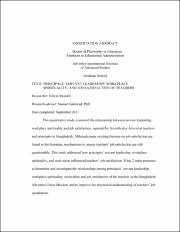| dc.description.abstract | This quantitative study examined the relationship between servant leadership,
workplace spirituality and job satisfaction, reported by Seventh-day Adventist teachers
and principals in Bangladesh. Although many existing theories on job satisfaction are
found in the literature, mechanisms to ensure teachers’ job satisfaction are still
questionable. This study addressed how principals’ servant leadership, workplace
spirituality, and motivation influenced teachers’ job satisfaction. It has 2 main purposes:
to determine and investigate the relationships among principals’ servant leadership,
workplace spirituality, motivation and job satisfaction of the teachers in the Bangladesh
Adventist Union Mission; and to improve the theoretical understanding of teachers’ job
satisfaction.
The subjects were 302 respondents (teachers and principals) of the 9 Adventist
International Mission schools and 7 boarding schools in Bangladesh. They responded to a
5-part questionnaire—demographic variables, the Job Satisfaction Survey, Servant
Leadership Survey, Workplace Spirituality Questionnaire, and Motivational Inventory.
The results showed moderately high levels of teachers job satisfaction, principals
servant leadership, workplace spirituality, and motivation. Teachers’ demographic
factors: gender, age, educational degree, and years of experience revealed a significant
difference in the relationship between teachers job satisfaction, and motivation, teachers
perception servant leadership, workplace spirituality. The tenured teachers perceived low
principals’ servant leadership, workplace spirituality, job satisfaction, and motivation
compared to young teachers.
The path analysis confirmed that principals’ servant leadership and workplace
spirituality form a fit model to predict teachers’ job satisfaction. The greatest predictor on
teachers’ job satisfaction was principals’ servant leadership (β = 0.431, p = 0.000,
r2 = .22), followed by workplace spirituality (β = 0.152, p = 0.001, r2 = .13). However,
the combination of these two variables had explained 25% (r2 = 25) variance of job
satisfaction.
Based on the results the following recommendations are made. Principals need to
give careful attention to individual needs of the tenured teachers. They should practice
servant leadership and involve tenured teachers in decision making to exercise teachers’
expertise in school leadership. They should occasionally review teachers’ motivation and
satisfaction levels through interviews, group discussions, and formal and informal
evaluation. Both teachers and principals should use the Servant Leadership Survey for a
personal checklist of their attitude toward students and toward parents to pursue quality
Christian education for the community. | en_US |

